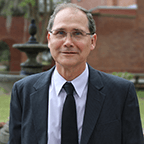Faculty and Staff
Francis M. Burns, Ph.D.
| Title: | Associate Professor |
| Department: | Chemistry USC Salkehatchie |
| Email: | FMBURNS@mailbox.sc.edu |
| Phone: | 843-782-8681 |
| Office: |
East Campus: Main 212 A |
| Resources: | Curriculum Vitae [pdf] |

Interests:
Travel, cooking, exercise and wellness, and interesting conversations.
Education
Ph.D., University of Toledo (Analytical Chemistry)
M.A., Ohio State University (Science Education)
B.S., Ohio State University (Entomology)
Bio
Professor Burns’ scholarship evolved from his interactions with students and communities. He entered an MA program in education to make a difference in society. Professor Burns’ started his academic career in Ohio, and included positions in Texas and Michigan, Koya University (Kurdish Region Government - Iraq), Diné College (Diné Reservation, Arizona) and the University of South Carolina Salkehatchie. He received excellent training during a doctorate in analytical chemistry, which has supported his diverse research projects. While working as a visiting professor at Ferris State University, Burns investigated student learning and critical thinking skills in order to improve his teaching skills. Seeking to establish himself in international education, Burns accepted a visiting lecturer position at Koya University (Iraq). While teaching analytical chemistry, he solved an environmental science problem involving oil wastewater. While teaching general chemistry at Diné College, Arizona Space Grant/NASA offered a $36,000 grant to incorporate atmospheric chemistry research into my STEM course. My students built electrochemical sensors, launched them into the stratosphere using a high-altitude balloon, and then presented their findings at an Undergraduate Research Symposium. Students have always driven Burns’ research activities.
Professor Burns’ current scholarship focuses on two themes. During his first semester at USC Salkehatchie, Burns discovered that many students
did not pass his courses. These students exhibited poor academic and non-academic
skills. They quickly dropped out of the USC system. Seeking to ameliorate this outcome,
Burns submitted a RISE grant proposal to the Office of Vice-President of Research.
The funded proposal started his efforts to understand student retention and success,
which has disseminated in presentations and publications. The Office of Vice-President
of Research funded a second RISE grant to support additional research. While teaching
pre-nursing chemistry, Salkehatchie asked Burns to teach forensic chemistry. This
course has resulted in a large USDA grant funding forensic science equipment, including
GCMS (drug and arson analysis) and HID (Human DNA analysis). The course and grant
has spurred communications with local law enforcement and Salkehatchie’s Criminal
Justice faculty. Collaborations have become an ongoing process. Professor Burns recently
received the Distinguished Research Service Award from the Office of Vice-President of Research.
Professor Burns’ teaching focuses on students. He puts it succinctly at the beginning
of his John Duffy Teaching Award application: “I endeavor to empower students possessing few advantages of America’s middle- and
upper-income students. My teaching builds understanding, tolerance and cooperation
between individuals. Teaching is more than a job for me. It is part of my life’s mission.”
While teaching at Diné College, Professor Burns learned that Diné [Navajo] students
are taught to remain silent and listen when an elder is teaching. Burns explained
to his students that he (as an elder) needed them to answer questions and be more than silent. After a few weeks they believed
him. When Burns’ Diné students made their research presentations at the Arizona Space Grant Symposium, they
introduced themselves using their matrilineage. The student presentations incorporated
Diné science as taught to them by a Diné colleague. Burns’ students received standing ovations from STEM faculty and students.
At Salkehatchie, Burns has flipped his classroom model so that students watch videos of the lecture portion before class time, which is now devoted to questions (and answers) posed by the professor and his students. Burns has focused considerable time and resources upon laboratory activities in forensic science and chemistry. He has received excellent support from his colleagues at USC Salkehatchie and Palmetto College. In recognition of his teaching efforts and achievements, Burns received the John Duffy Award for Teaching Excellence.
Classes
CHEM 101 | Fundamental Chemistry I
CHEM 102 | Fundamental Chemistry II
CHEM 107 | Forensic Chemistry
CHEM 111 | General Chemistry I
CHEM 111 | General Chemistry II
Awards:
2024 USC Distinguished Research Service Award
2024 University of South Carolina RISE grant ($5,998)
2022 USC Innovative Teaching Course Development Grant ($2,500)
2022 USC John Duffy Excellence in Teaching Award
2019 USDA Rural Development Grant ($150,000)
2018 University of South Carolina RISE Grant ($8,000)
2017 NASA/Arizona Space Grant Consortium ($36,000)